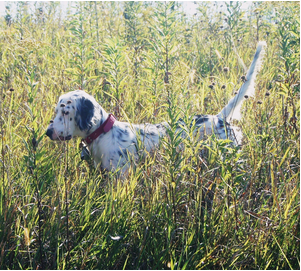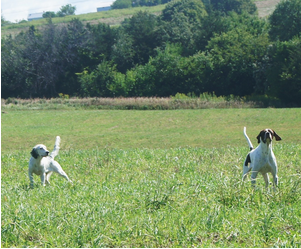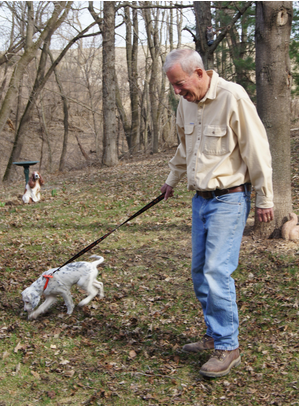Developing the Barnburner
Pointing Dog Pointer
by Bob and Jody Iler

Barnburners will be intense on point.
Our definition of a barnburner is a very high energy young dog that has tremendous drive and speed in the field and might even be a borderline “outlaw.” We are especially excited by barnburners, but recognize the challenge that they present to the average pointing dog owner, especially if this pup is his or her first pointing dog.
You can sometimes see evidence of the barnburner as you check over a litter of pups. This little fellow or gal will often be the one that scales the whelping box first, heading for parts unknown—and quickly! This pup may be more interested in the surroundings than in you as you check out the litter, unlike the pups that come running up for attention first, or the pups that may simply sit back and observe the whole business.
And now that we’ve said that, we’ll add that barnburners can often seem like sleepy-eyed future couch potatoes among their littermates or perhaps appear quiet and reserved. So how the heck are you to pick the pup that is or is not a barnburner (depending on your preference) at that early stage?
Our recommendation is to trust the experienced breeder. He or she has been around the pups since birth: handling, feeding, cleaning, and otherwise interacting with the pups. All the while, the breeder is observing them to see what personalities seem to be emerging. A good breeder is proficient at matching pups with suitable owners. Another important clue is, of course, the pup’s pedigree and parents. If one or both of the parents are barnburners, or if there are many field trial champions in the pedigree, odds increase!
So, all things aside, let’s say you’ve recognized the signs and realize that your little pointing dog bundle is fast becoming supercharged, what should you know? What should you do?
Your first clues are often in the field. As you develop your pup on birds, you’ll notice that the pup is likely bird crazy, with great desire and hunt. At the flush, pup will often chase the bird for a great distance, often ignoring your command to come. As you head to the field or walk your pup in an area where birds or other game may be found, your barnburner will be straining at the lead or checkcord. These, of course, are the traits we love to see in a pointing dog pup! We can’t put that drive and almost uncontrollable love of birds in a pup. They either have it or they don’t.
And if they have it, your main concern is safety as you develop this bundle of energy. Barnburners can leap out of the truck crate and run across a busy highway; they can disappear and get lost in pursuit of other critters besides birds, such as deer, raccoons and the like. You can imagine other scenarios where your barnburner can get into trouble, maybe ending in tragedy.

Wait until the barnburner has developed control before working her with another dog.
The checkcord will be your invaluable aid in helping to control the barnburner. We want that zest in young pups to help them turn on to birds. Too much checkcord work can intimidate some types, but the barnburner needs regular checkcord sessions, with consistent handling practice in quartering and whistle work. It is key for the barnburner to learn to pay attention to you and mind your commands. The checkcord provides the means to show the pup what you want, and humanely enforce it. During those “teenage months” where most pups, barnburners or no, tend to become deaf, this control work is especially crucial.
Using an e-collar with a barnburner pup can be tempting, but we strongly advise against doing this with young inexperienced dogs, or without real knowledge of how to properly use the collar. Toner, vibrator, and low-level stimulation can be helpful, but only after the lessons have been taught and the dog knows what you want. Even then, we would not use the collar on a young dog and chance taking away the traits that will make him not just a good pointing dog, but a great one. Keep plugging away with your checkcord control work and be sure to enlist the help of a good e-collar professional if you feel it is necessary. Be wary of advice from the “so-called expert” who wants to strap a collar to your dog to “fix” him. We can say with surety that this will cause more problems that it would ever solve, and may damage a dog irreparably.
The control work extends far beyond the field as well. The barnburner benefits greatly from regular (as in daily) yard work sessions. School your pup in the basics of heel, whoa and here. Do not call him to you without the checkcord to enforce it. Teach him to whoa reliably and test him in other areas and situations beyond your regular training grounds. Dogs become patterned trained and may do well with yard work in your yard; take the dog elsewhere and the training seems to be forgotten.
Make your dog whoa before he goes in the crate or the house. Make him whoa when you open his kennel gate to put his training lead on. Make him whoa when you open the dog crate in the truck to let him out; don’t allow the barnburner to jump out of the truck and run around. Rather, keep your barnburner on a lead and heel him for much of his first year. Let him run without the checkcord only when he will be safe or has learned to handle and obey your commands consistently. This takes time and patience, and more time and patience.

Who knew this cute pup would be a barnburner!
Refrain from running your barnburner with another dog before she handles well for you alone. Although running with another dog can help pups to stretch out and hunt at longer ranges, this can also create competition between the budding barnburner and the other dog. The barnburner begins to focus her attention on where the other dog is going and pays less and less attention to you.
Owning a pointing dog that is also a barnburner can be a challenge. There is a fine line between training pressure and development of this type of pup. We want to keep the sparkle and joy of the hard-driving barnburner even as we do our best to develop her into a dog that has learned restraint when needed and obedience when it could save her life.
You and your barnburner will reap the rewards of patience and consistent training as you allow your pup the time to develop her full potential without diminishing her natural overdrive! The result will be a dog with style, class and the invisible bond of a true hunting partner.
Pointing Dog Pointers features monthly training tips by Bob and Jody Iler, who own Green Valley Kennels in Dubuque, Iowa. Bob and Jody have trained pointing dogs for over 35 years and have written many articles for The Pointing Dog Journal.


